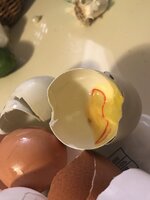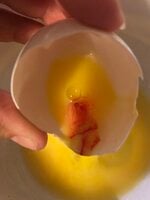I have 19 hens and 1 roo. For the last year or so, due to repeated attacks and flock loss, I increased my run size and limit free range time. (They still get about an hour a day or so of free ranging.) So I noticed this spring (End of April/May) that some of the girls were molting. They are about a year and a half old, variety of breeds. No biggie. At the same time, we had a never ending stretch of rain. Weeks of rain left a sloppy and GROSS run, as well as limited range time. I did my best to keep them out of the muck, and keep fresh water. Their feathers were all kinds of crazy. 6 or 7 had naked butts, a few had naked necks, and then I noticed a few had bare backs, which I assumed was aggravated by the rooster. some of them had diarrhea. I started to get really worried. Then, one day I saw a roundworm.
We had a gap in rain, so I attacked with DE, started adding ACV in the water, threw herbs in the nest boxes. I also started feeding feather fixer. I also started getting eggs with runny yolks. (I have dealt with that one other time a few years ago. Annoying, but it eventually passed.) After a week or so, I bought a soothing mite spray (Couldn't get close enough), mite spray for boxes and roosts, and also tried the natural worming pellets (Strike pellets.) After another week or two, some of the girls got feathers back, but not all. Most poo is normal, egg yolks firmed back up. I added a better dusting area to the run. No signs of worms anywhere.
Last week, I noticed that a few of the hens have just never bounced back. There are STILL a few naked butts and backs with no pin feathers in sight. Diarrhea seems to be making a comeback, but it has been brutally hot and humid here. I am still feeding feather fixer. TODAY- I went to use eggs, (I gather every other day) and I had to crack 12 to get 4 usable eggs. The others were all watery, and most had extensive lines of blood and traces of an embryo. (SEE PICS)How in the world can that happen in 2 days? ( I do have three crazy broody hens but I cannot get them to break so I gave up- which I know I shouldn't have.) Everything seems to be a MESS.
So my questions are...
How do I treat them or do I need to? If I should worm, do I go with strong stuff or something like Zyfend A so I don't have to throw out eggs?
Do I separate or get rid of the roo so they can have a break and their backs can regrow?
I plan to go back to getting the eggs every day now.
Is all of this because of worms and possible mites? Or is there something deeper going on? I need to hit the RESET button. Any advice appreciated!
We had a gap in rain, so I attacked with DE, started adding ACV in the water, threw herbs in the nest boxes. I also started feeding feather fixer. I also started getting eggs with runny yolks. (I have dealt with that one other time a few years ago. Annoying, but it eventually passed.) After a week or so, I bought a soothing mite spray (Couldn't get close enough), mite spray for boxes and roosts, and also tried the natural worming pellets (Strike pellets.) After another week or two, some of the girls got feathers back, but not all. Most poo is normal, egg yolks firmed back up. I added a better dusting area to the run. No signs of worms anywhere.
Last week, I noticed that a few of the hens have just never bounced back. There are STILL a few naked butts and backs with no pin feathers in sight. Diarrhea seems to be making a comeback, but it has been brutally hot and humid here. I am still feeding feather fixer. TODAY- I went to use eggs, (I gather every other day) and I had to crack 12 to get 4 usable eggs. The others were all watery, and most had extensive lines of blood and traces of an embryo. (SEE PICS)How in the world can that happen in 2 days? ( I do have three crazy broody hens but I cannot get them to break so I gave up- which I know I shouldn't have.) Everything seems to be a MESS.
So my questions are...
How do I treat them or do I need to? If I should worm, do I go with strong stuff or something like Zyfend A so I don't have to throw out eggs?
Do I separate or get rid of the roo so they can have a break and their backs can regrow?
I plan to go back to getting the eggs every day now.
Is all of this because of worms and possible mites? Or is there something deeper going on? I need to hit the RESET button. Any advice appreciated!






 Thank you in advance
Thank you in advance 



